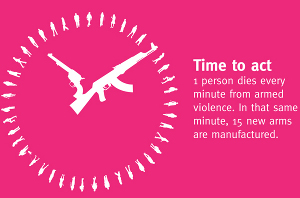Editorial
The need to be radical, getting to the roots

Image: armscontrol
It is often said, with a contemptuous or condescending tone, that people and groups that –from academia, institutions or social movements– struggle to build peace are utopian. And undoubtedly we are, but in a particular sense: we often seek that which does not fully exist yet anywhere (as it is expressed by the etymology of the word), but we are never chimerical nor seekers of the impossible. What is sought is possible and probable, with differing degrees of likelihood. Other times it is said that the campaigns and demands of these people and groups are radical, with a connotation of reproach. And yes, we are radicals, but in a different and precise meaning of the term: we are radicals because we want to reach, in analysis and in intervention, the root of things. In other words, we cannot settle for solely treating the symptoms, as doctors do. When something is urgent, it is necessary to study and address the underlying reasons, the aetiology. As it was stated perceptively by John Paul Lederach while debating with William Zartman about whether or not it is possible to negotiate a resolution to a conflict before conditions are ripe for success, there would never be anything ready for picking in the fields if they weren't previously prepared, cultivated and planted. Investigating and acting for what is right means being radical, getting to the roots.
And now is the time to be radical, as we are reminded by the special edition of the magazine devoted to the final negotiations regarding the future treaty to regulate arms trade. It makes no sense that some statesmen are outraged because, in the midst of a civil war, Russia is selling weapons to the Syrian government or because some countries provide arms to rebel forces –like they did in Libya, in this case breaching the mandates of the Security Council. It is okay to be angry, but then try to find the underlying causes, the reasons for which arms are reaching Syria. If we go to the roots, the facts speak for themselves. First, the primary arms sellers have been for decades the five permanent members of the Security Council, which is as bad an example for peaceful international relations as the fact that all of them are nuclear powers. Second, because so far, they have not wanted to accept the irrefutable conclusion that if you produce weapons to sell, you end up selling them, and that, despite the agreement to respect certain voluntary codes of conduct or weak rules to not supply weapons to countries in armed conflict or countries that violate fundamental human rights, the temptation to sell when there is precisely more demand (i.e., in the midst of an armed conflict) is nearly irresistible. Third, in short, without strict rules and mechanisms for monitoring and compliance based on economic reasons, arms will be sold, bought (or given away) and used.
Hence the importance of demanding the world's largest powers, the permanent members, in New York throughout the month of July, and in general, all countries, to rise to the occasion, to be radical, to get at the roots. We need a clear and precise regulation of arms trade, of the situations in which it is forbidden and/or restricted, with well-designed and efficient control and monitoring mechanisms that are varied and conducted at different times. Otherwise, the business of weapons will continue to cause deaths, injuries, collateral damage, armed conflicts and human rights violations and will hinder the development and building of peace. Let us recall the motto of The Enlightenment so esteemed by Kant, Sapere aude, dare to know!